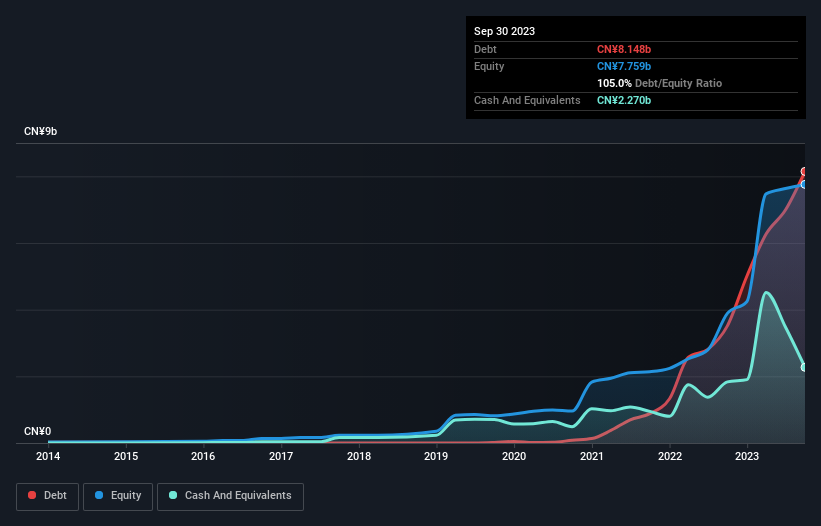
Warren Buffett famously said, 'Volatility is far from synonymous with risk.' So it might be obvious that you need to consider debt, when you think about how risky any given stock is, because too much debt can sink a company. We can see that Ginlong Technologies Co., Ltd. (SZSE:300763) does use debt in its business. But the more important question is: how much risk is that debt creating?
Why Does Debt Bring Risk?
Debt assists a business until the business has trouble paying it off, either with new capital or with free cash flow. Ultimately, if the company can't fulfill its legal obligations to repay debt, shareholders could walk away with nothing. However, a more usual (but still expensive) situation is where a company must dilute shareholders at a cheap share price simply to get debt under control. Of course, debt can be an important tool in businesses, particularly capital heavy businesses. The first step when considering a company's debt levels is to consider its cash and debt together.
See our latest analysis for Ginlong Technologies
What Is Ginlong Technologies's Debt?
As you can see below, at the end of September 2023, Ginlong Technologies had CN¥8.15b of debt, up from CN¥3.51b a year ago. Click the image for more detail. However, because it has a cash reserve of CN¥2.27b, its net debt is less, at about CN¥5.88b.

How Strong Is Ginlong Technologies' Balance Sheet?
Zooming in on the latest balance sheet data, we can see that Ginlong Technologies had liabilities of CN¥5.73b due within 12 months and liabilities of CN¥7.25b due beyond that. On the other hand, it had cash of CN¥2.27b and CN¥1.06b worth of receivables due within a year. So its liabilities outweigh the sum of its cash and (near-term) receivables by CN¥9.65b.
Ginlong Technologies has a market capitalization of CN¥22.2b, so it could very likely raise cash to ameliorate its balance sheet, if the need arose. However, it is still worthwhile taking a close look at its ability to pay off debt.
In order to size up a company's debt relative to its earnings, we calculate its net debt divided by its earnings before interest, tax, depreciation, and amortization (EBITDA) and its earnings before interest and tax (EBIT) divided by its interest expense (its interest cover). Thus we consider debt relative to earnings both with and without depreciation and amortization expenses.
Ginlong Technologies's debt is 3.6 times its EBITDA, and its EBIT cover its interest expense 6.4 times over. This suggests that while the debt levels are significant, we'd stop short of calling them problematic. Also relevant is that Ginlong Technologies has grown its EBIT by a very respectable 25% in the last year, thus enhancing its ability to pay down debt. There's no doubt that we learn most about debt from the balance sheet. But it is future earnings, more than anything, that will determine Ginlong Technologies's ability to maintain a healthy balance sheet going forward. So if you're focused on the future you can check out this free report showing analyst profit forecasts.
But our final consideration is also important, because a company cannot pay debt with paper profits; it needs cold hard cash. So we always check how much of that EBIT is translated into free cash flow. Over the last three years, Ginlong Technologies saw substantial negative free cash flow, in total. While that may be a result of expenditure for growth, it does make the debt far more risky.
Our View
Ginlong Technologies's struggle to convert EBIT to free cash flow had us second guessing its balance sheet strength, but the other data-points we considered were relatively redeeming. In particular, its EBIT growth rate was re-invigorating. Looking at all the angles mentioned above, it does seem to us that Ginlong Technologies is a somewhat risky investment as a result of its debt. That's not necessarily a bad thing, since leverage can boost returns on equity, but it is something to be aware of. When analysing debt levels, the balance sheet is the obvious place to start. However, not all investment risk resides within the balance sheet - far from it. These risks can be hard to spot. Every company has them, and we've spotted 3 warning signs for Ginlong Technologies (of which 2 are a bit concerning!) you should know about.
When all is said and done, sometimes its easier to focus on companies that don't even need debt. Readers can access a list of growth stocks with zero net debt 100% free, right now.
New: Manage All Your Stock Portfolios in One Place
We've created the ultimate portfolio companion for stock investors, and it's free.
• Connect an unlimited number of Portfolios and see your total in one currency
• Be alerted to new Warning Signs or Risks via email or mobile
• Track the Fair Value of your stocks
Have feedback on this article? Concerned about the content? Get in touch with us directly. Alternatively, email editorial-team (at) simplywallst.com.
This article by Simply Wall St is general in nature. We provide commentary based on historical data and analyst forecasts only using an unbiased methodology and our articles are not intended to be financial advice. It does not constitute a recommendation to buy or sell any stock, and does not take account of your objectives, or your financial situation. We aim to bring you long-term focused analysis driven by fundamental data. Note that our analysis may not factor in the latest price-sensitive company announcements or qualitative material. Simply Wall St has no position in any stocks mentioned.
About SZSE:300763
Ginlong Technologies
Engages in the research, development, production, service, and sale of string inverters worldwide.
High growth potential and fair value.
Similar Companies
Market Insights
Community Narratives



